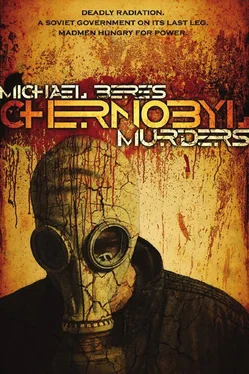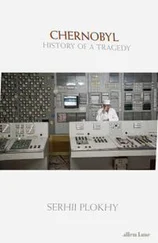Michael Beres - Chernobyl Murders
Здесь есть возможность читать онлайн «Michael Beres - Chernobyl Murders» весь текст электронной книги совершенно бесплатно (целиком полную версию без сокращений). В некоторых случаях можно слушать аудио, скачать через торрент в формате fb2 и присутствует краткое содержание. Жанр: Триллер, на английском языке. Описание произведения, (предисловие) а так же отзывы посетителей доступны на портале библиотеки ЛибКат.
- Название:Chernobyl Murders
- Автор:
- Жанр:
- Год:неизвестен
- ISBN:нет данных
- Рейтинг книги:4 / 5. Голосов: 1
-
Избранное:Добавить в избранное
- Отзывы:
-
Ваша оценка:
- 80
- 1
- 2
- 3
- 4
- 5
Chernobyl Murders: краткое содержание, описание и аннотация
Предлагаем к чтению аннотацию, описание, краткое содержание или предисловие (зависит от того, что написал сам автор книги «Chernobyl Murders»). Если вы не нашли необходимую информацию о книге — напишите в комментариях, мы постараемся отыскать её.
Chernobyl Murders — читать онлайн бесплатно полную книгу (весь текст) целиком
Ниже представлен текст книги, разбитый по страницам. Система сохранения места последней прочитанной страницы, позволяет с удобством читать онлайн бесплатно книгу «Chernobyl Murders», без необходимости каждый раз заново искать на чём Вы остановились. Поставьте закладку, и сможете в любой момент перейти на страницу, на которой закончили чтение.
Интервал:
Закладка:
We need food so we can continue working.”
The man sitting next to the woman in the yellow babushka waved his hand. “Nothing makes sense when people are forced from their homes. How would you like to lose everything and be forced to sleep in barns and tents and practically beg for food for your children?”
“At least,” said the man in the leather cap, “they could come work in the fields. What else have they got to do?”
“The people in my barn wanted to work,” said the woman in the yellow babushka. “But the chairman said no. He said they all have to stay where they are because officials are arriving today from Kiev.”
“What for?”
“A census,” said the woman. “The chairman says they might relocate some people farther south and west.”
“Good,” said the man in the leather cap. “Maybe things will get back to normal and I’ll have a decent meal. Look how thin I am.”
The bus passengers laughed, and even the man in the leather cap smiled as he turned to look out the bus windshield. The only one who didn’t laugh or smile was the driver, who was in his own world, the world of the throbbing engine and the shifting of gears and the dodging of holes in the road.
Within the Kopelovo collective village, behind one of the houses lining the road, Lazlo lifted the canvas tent flap and looked outside. The tent opening faced away from the house, with a view of the family’s freshly planted private plot. A thin layer of ground fog was being burned away by morning sun. The damp morning air smelled of livestock and smoldering trash fires.
Lazlo heard footsteps in the weeds, leaned out, and saw the man from the next tent over. The farmer from the north lived in a tent with his wife and two children. A goat tethered outside during the day was allowed inside the tent at night. The farmer walked back from the outhouse carrying a rolled-up newspaper in one hand and a tin cup in the other. He hummed a Ukrainian folk song. Although Lazlo did not know the name of the song, he knew it glorified morning. A cheerful song of hope and hard work, a song he sometimes heard the skinny baker at his favorite bakery whistle in the back room before bringing out a fragrant tray of pastry.
The thought of the warm Kiev bakery made Lazlo shiver. He dropped the tent flap and sat back on his heels. He reached up to touch the warm slope of the tent where the orange of the sun glowed.
Although the cut on his wrist was healed, his ankle still ached from the jump to the scaffold at the Hotel Dnieper. He turned and crawled to the back of the tent where Juli slept. He lifted the blankets carefully so as not to let in cold, damp air. Beneath the blankets, he felt Juli’s warmth against him and his shivering stopped.
After the narrow escape at Lenkomsomol Square, Lazlo met Juli at the hospital. Dressed as peasants and with Lazlo wearing an eye patch to disguise himself, they’d gone to one of the roadblocks and joined the line of people trying to enter Kiev. Lazlo had worked the roadblocks long enough to know how to use the situation to their advantage. He knew that instead of being allowed in, they would be transported with others to a collective many kilometers away. He also knew they could do this without identification because during the rapid evacuation, many refugees failed to obtain passes. He let Juli do most of the talking, saying they were from Pripyat and had worked in a department store. He kept his face hidden, and none of the militia officers recognized him.
They had been here at the Kopelovo collective a full week, freez-ing in the tent each night and keeping trim on the daily ration of food provided. Kiev was a hundred kilometers northeast, and he might never see it again. His sprained ankle had healed, and he was ready to move on. The question was where to go and when. The only logical direction was west, to Czechoslovakia or Hungary or even farther. The time would be soon, because yesterday there were rumors of relocation. Paperwork would be completed, names put on file, and representatives of the militia or the KGB milling about.
They were fugitives, both considered criminals-him a murderer and Juli his accomplice. It didn’t matter if the agent aimed his pistol at them. To the KGB, one of their own was dead. No matter if the incident was a setup and Tamara’s poet friend was a KGB informer.
He recalled Tamara’s anger at the poet when he met her at the river, saying she would kill him if she saw him again. Lazlo had insisted she not make trouble for herself. He needed her to follow through on the faked betrayal so she would not be implicated when he and Juli escaped.
Would he ever see Tamara again? Would he tell her about his confusion when he realized he was attracted to Juli? Would he tell her about the past week, during which he and Juli posed as husband and wife living in an army tent on the Kopelovo collective? Would he tell Tamara he was in love?
As he lay beside Juli, Lazlo could feel the heat of her breath on his face. He kissed her cheek and held her close. But at his back the chill of morning touched him, reminding him that Nina, Anna, and little Ilonka were in Kisbor. Komarov would know Lazlo must go there. If he and Juli escaped across the frontier without going to Kisbor, Komarov would take revenge. The thought of going to Kisbor and of what he must do became icy fingers pulling him away from Juli and her unborn child.
Coming awake, Juli thought she felt her baby move. She wondered if time had sped up, if months had passed and she was in a bed in an apartment with Lazlo by her side. But when she opened her eyes, she saw the tent roof. Time had not sped up. They were still at the collective. She was still in her seventh or eighth week of pregnancy and certainly would not have been able to feel the baby move. The momentary thought of being in a bed with Lazlo was a dream. But at least part of it was true. Lazlo was with her, holding her tightly.
“I thought you were my baby.”
Lazlo kissed her cheek. “I am your baby.”
“When you moved, I thought it was my baby moving. I dreamed we were somewhere safe with no one looking for us. I was big and fat, and you still loved me.”
Lazlo smiled. “It’s a wonderful dream.”
“I hope it comes true.”
“It can if we cross the frontier. We’ll be able to go to a good hospital and get you and your baby checked. We’ll be able to tell someone what you know about Chernobyl. We’ll find somewhere to live instead of a moth-eaten tent.” Lazlo sat up and looked down at her with a broad grin. “It’s nothing but good news from now on.”
“I like seeing you smile, Laz.”
“I rarely smiled before I met you.”
They kissed and made love beneath the rough army blankets.
After a breakfast of canned sardines, bread, and bottled water, Juli reviewed with Lazlo the information about Chernobyl they hoped to get to officials at the International Atomic Energy Agency in Vienna. The information included what Mihaly told Juli before he died-the experiment to see how long the inertia of the turbine could generate emergency power, the emergency backups turned off while the reactor was still running, the absence of the chief engineer who had ordered the experiment, printouts of reactor conditions not available directly to control-room personnel, speculation about Chernobyl being used as a guinea pig for other reactors of the same type throughout the country. Juli had memorized as much as possible and recited the details each day to Lazlo. She also included information she knew from her job, including specific figures she recalled concerning radionuclide sampling around the power station before the explosion.
“It’s like being in school again,” said Lazlo. “A big tough guy with his Makarov pistol strapped to his chest back in school.”
Читать дальшеИнтервал:
Закладка:
Похожие книги на «Chernobyl Murders»
Представляем Вашему вниманию похожие книги на «Chernobyl Murders» списком для выбора. Мы отобрали схожую по названию и смыслу литературу в надежде предоставить читателям больше вариантов отыскать новые, интересные, ещё непрочитанные произведения.
Обсуждение, отзывы о книге «Chernobyl Murders» и просто собственные мнения читателей. Оставьте ваши комментарии, напишите, что Вы думаете о произведении, его смысле или главных героях. Укажите что конкретно понравилось, а что нет, и почему Вы так считаете.












